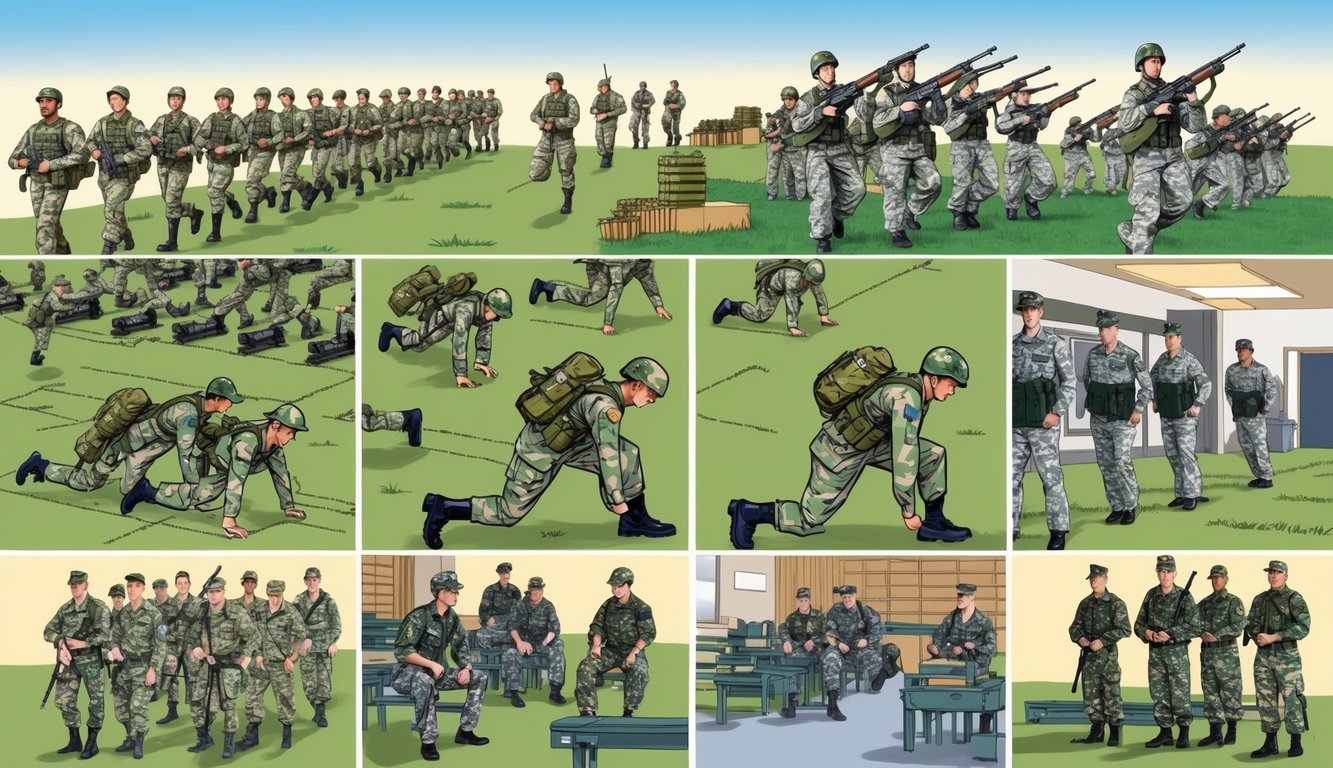Military boot camp offers a rigorous experience that transforms civilians into soldiers.
You might believe you’re ready, but numerous surprises await you. From the moment you step foot on the base, you’ll be challenged physically and mentally in ways you never expected.
Boot camp goes beyond just physical conditioning; it imparts essential skills like teamwork, discipline, and the ability to problem-solve under stress.
This training aims to enhance your confidence and equip you for the demands of military life.
Did you know that many recruits may go a week without a bowel movement upon arrival? Or that you’ll be required to finish your meals in under five minutes? These are just a few of the surprising elements of boot camp that many find shocking.
Key Takeaways
- Boot camp pushes you beyond your physical and mental limits
- Along with physical fitness, you’ll cultivate vital skills such as teamwork and discipline
- Unexpected challenges like sleep deprivation and fast-paced meals play a role in your transformation
Enlisting Process
The journey toward enlisting in the military begins with meeting a recruiter and submitting the necessary documentation.
This step is crucial for confirming your eligibility and understanding your commitment.
Meeting the Recruiter
Your military pathway starts with a recruiter who will discuss your aspirations and assist you in selecting the right branch and job.
Being honest about your background and potential disqualifiers is key.
Recruiters can provide insights on training, benefits, and various career paths.
To prepare for your appointment, do some research on different military roles and come armed with questions.
The recruiter will guide you through the enlistment process and help schedule the ASVAB test to assess your suitability for various military occupations.
Proof of Citizenship and Legal Requirements
To officially enlist, you’ll need to demonstrate your citizenship or legal residency.
Bring your birth certificate, Social Security card, and a government-issued ID along to your meeting.
If you’re not a U.S. citizen, additional documentation like a green card will be required.
The military enforces strict legal criteria.
You’ll need to be transparent about any criminal history, including minor offenses.
Disclose any medical conditions as some could disqualify you from service.
The recruiter will assist with the necessary paperwork and inform you about any possible waivers.
Honesty is paramount; dishonesty during the enlistment process can lead to serious repercussions, including discharge from the military.
Your First Days at Boot Camp
Your early days in boot camp are highly intense and can feel overwhelming.
You’ll encounter a flurry of activities meant to transition you from civilian life to military duties.
Reception Battalion
Your initial contact point is the reception battalion.
Here, you’ll receive uniforms, boots, and basic gear.
Prepare for a buzz cut and an avalanche of paperwork.
Medical examinations and vaccinations will also take place.
The atmosphere can feel tense, even if things move at a slower pace.
Feeling disoriented is normal; everyone experiences it.
You’ll quickly learn to stand at attention and address superiors correctly.
Expect limited sleep—you could only manage a few hours each night.
Meals will be simple yet filling, consumed rapidly in the dining facility.
Adjusting to Military Discipline
Discipline will hit you like a ton of bricks.
Drill sergeants yell constantly—not out of anger but as a means of conditioning you to follow orders without hesitation.
You will learn to function as part of a unit in terms of movement, speech, and thought.
Everything operates on a precise schedule.
Wake-up time is 4:30 AM for physical training.
Your bed must be made impeccably, and your uniform cannot have a speck of dirt.
You’ll memorize the Soldier’s Creed and military regulations.
Mistakes could lead to push-ups or other forms of exercise.
While tough, you’ll adapt faster than you think.
Physical Fitness Training
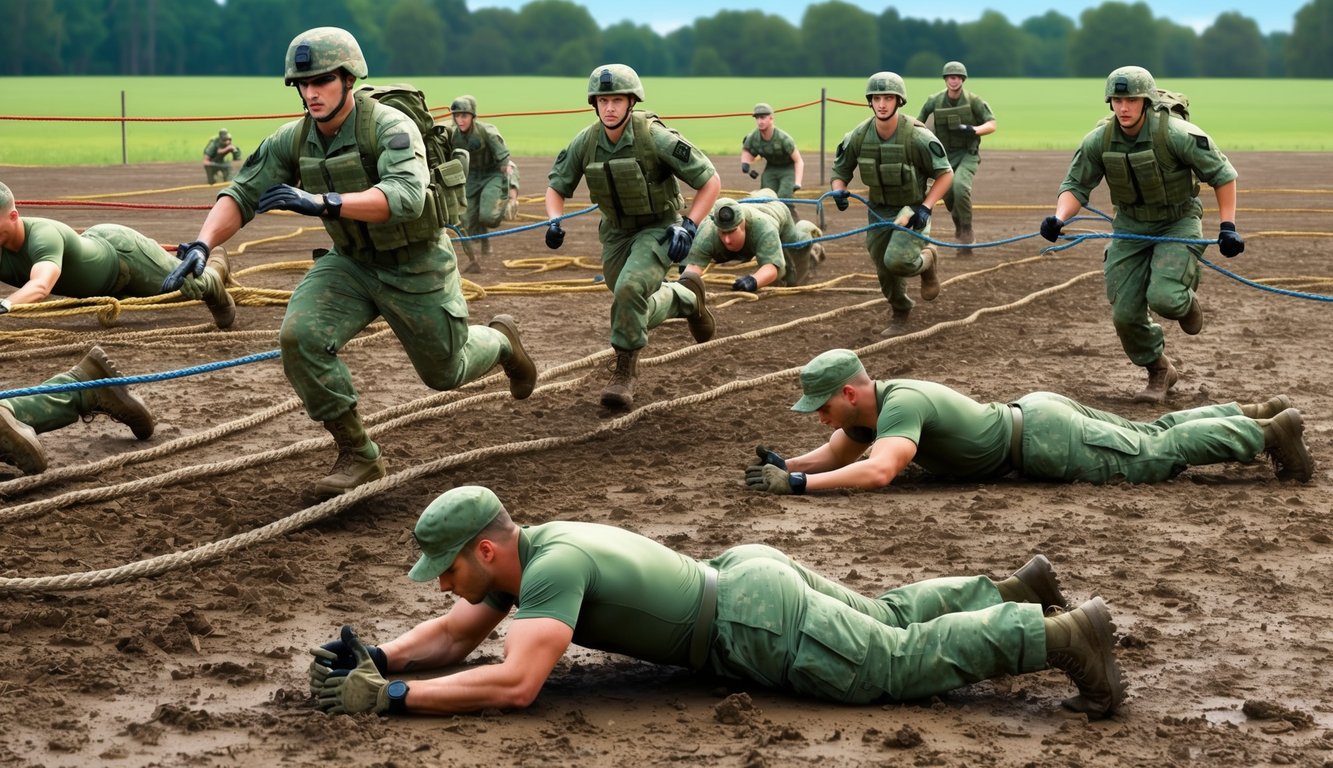
Boot camp challenges your physical abilities with strenuous workouts and rigorous fitness benchmarks.
Be ready for demanding PT sessions and tough fitness evaluations.
The Importance of Physical Fitness
Physical fitness is vital within the military.
You’ll need strength and endurance for combat readiness.
Daily workouts will involve push-ups, sit-ups, and running to enhance muscle strength, cardiovascular health, and stamina.
Plyometric exercises like jumping jacks and burpees will also be included to improve agility and explosiveness.
Anticipate carrying heavy gear during marches and navigating obstacle courses.
Staying fit can also minimize injury risks.
It’s not just about passing fitness tests; it’s about ensuring you can survive on the battlefield, with your teammates relying on your performance.
Fitness Test Standards
Fitness assessments play a crucial role in determining your readiness.
Each branch has unique standards, but they generally consist of:
- Push-ups (1-2 minutes)
- Sit-ups (1-2 minutes)
- 1.5 to 3-mile run
For males aged 17-21, the minimum passing scores are as follows:
| Exercise | Army | Navy | Air Force |
|---|---|---|---|
| Push-ups | 42 | 42 | 33 |
| Sit-ups | 53 | 50 | 42 |
| Run | 15:54 (2 miles) | 12:15 (1.5 miles) | 11:57 (1.5 miles) |
Note that these standards differ by age and gender, so you’ll need to exceed the minimums to stay competitive.
Regular training before boot camp is crucial to prepare for these requirements.
Phases of Training
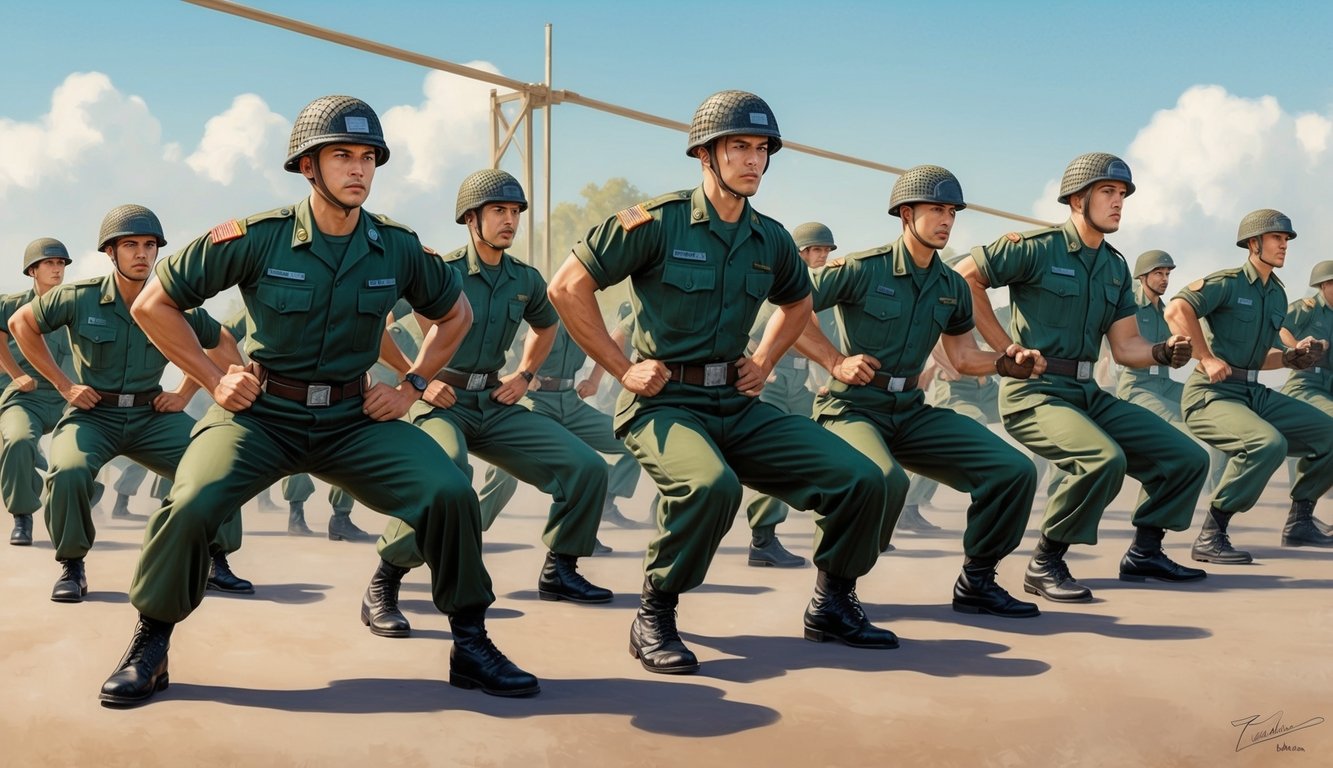
Training in boot camp is structured into distinct phases, with each one building on the previous to hone the skills necessary to transform civilians into soldiers.
Each phase gradually amplifies the physical and mental challenges while teaching essential military competencies.
Red Phase: The Basics
Your training begins in the Red Phase, or Patriot Phase, where the fundamental aspects of soldiering are introduced.
You’ll learn military discipline, fitness routines, and basic combat techniques.
During this phase, you’ll concentrate on:
- Understanding military customs and courtesies
- Drill and ceremony
- Army Core Values
- Basic first aid
- Land navigation
Prepare for early mornings, demanding physical training, and significant learning challenges.
You will be pushed beyond your comfort zone, as drill instructors focus on instilling discipline and teamwork.
White Phase: Intermediate Skills
Progressing into the White Phase means building on the foundational skills obtained during the Red Phase, particularly in marksmanship.
Key elements of the White Phase include:
- Weapons qualification
- Advanced first aid
- Tactical foot marches
- Field training exercises
You’ll spend considerable time at the firing range to sharpen your skills with various weapons.
Collaborating in teams becomes increasingly vital as you engage in more elaborate training scenarios.
Blue Phase: Advanced Techniques
The Blue Phase culminates your boot camp experience before graduation, as you put all your training into practice during demanding field exercises.
This phase emphasizes:
- Advanced tactical training
- Nighttime operations
- Urban warfare strategies
- Final physical fitness evaluations
You’ll confront your toughest obstacles, including extended field exercises simulating combat conditions.
Your problem-solving and leadership capabilities will be thoroughly tested.
Completing the Blue Phase signifies your transformation from civilian to a confident, capable soldier ready for military service.
Teamwork and Collaboration
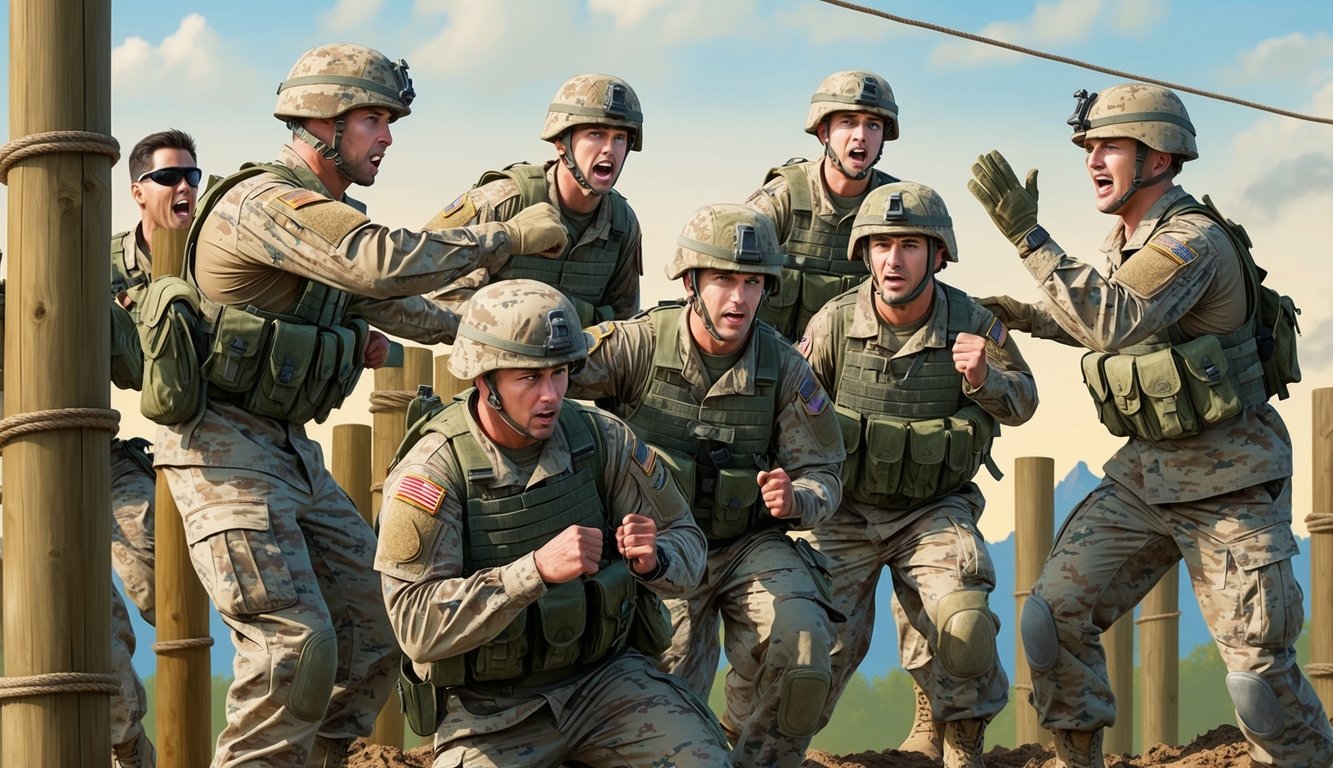
Boot camp is fundamentally about transforming individuals into a unified team.
You quickly grasp that teamwork isn’t merely a concept—it’s crucial for survival.
From the onset, group activities are a part of your training—whether it’s tackling obstacle courses or executing missions, your collective strength dictates your success.
Skills as a soldier extend beyond marksmanship and fitness to include:
- Effective communication
- Collaborative problem-solving
- Supporting fellow recruits
Your life at boot camp consists of communal living, where eating, sleeping, and training in tandem builds strong bonds and fosters reliance upon each other.
Diverse military branches approach teamwork in their distinct fashions.
For instance, the Marines cultivate collaboration through principles of honor, courage, and commitment.
It’s important to check your ego at the door.
No longer an individual, you’re now part of a larger entity—the success of your team is paramount.
Boot camp simulates high-pressure scenarios, illustrating how teamwork can be a matter of life and death.
By the end of your training, you’ll have a profound understanding of the importance of collaboration.
This valuable skill will benefit you throughout your military career and beyond.
Combat and Field Training
Boot camp equips recruits for the physical and mental rigors of military service, teaching vital combat skills and offering hands-on experience with weaponry and tactical maneuvers.
Weapons and Rifle Marksmanship
A significant component of your boot camp experience is mastering firearms.
Instructors will guide you through the proper handling, upkeep, and shooting practices for various weapons.
Your main focus will likely be the M16 rifle or M4 carbine, where you will become adept at disassembling, cleaning, and reassembling these firearms swiftly and accurately.
Marksmanship training will involve extensive practice at the firing range, where you’ll hone your shooting skills from various positions—standing, kneeling, and prone.
Accuracy is vital, necessitating numerous drills to meet qualification benchmarks.
Night firing training introduces an additional layer of challenge, teaching you to engage targets in low-light conditions using specialized optics.
Hand-to-Hand Combat and Self-Defense
Close-quarters combat forms a crucial aspect of your training.
You’ll acquire techniques to defend against and overcome opponents without relying on weapons.
Instructors will demonstrate strikes, blocks, and takedown methods.
Practicing these techniques with your peers will help build muscle memory and self-assurance.
You’ll also engage in grappling exercises where you’ll learn how to escape holds and restrain opponents effectively.
Our self-defense curriculum emphasizes situational awareness, helping you assess potential threats quickly and react accordingly.
Mental fortitude will be prioritized at all times, as instructors challenge you to remain focused and decisive under duress.
Survival Skills and Navigation
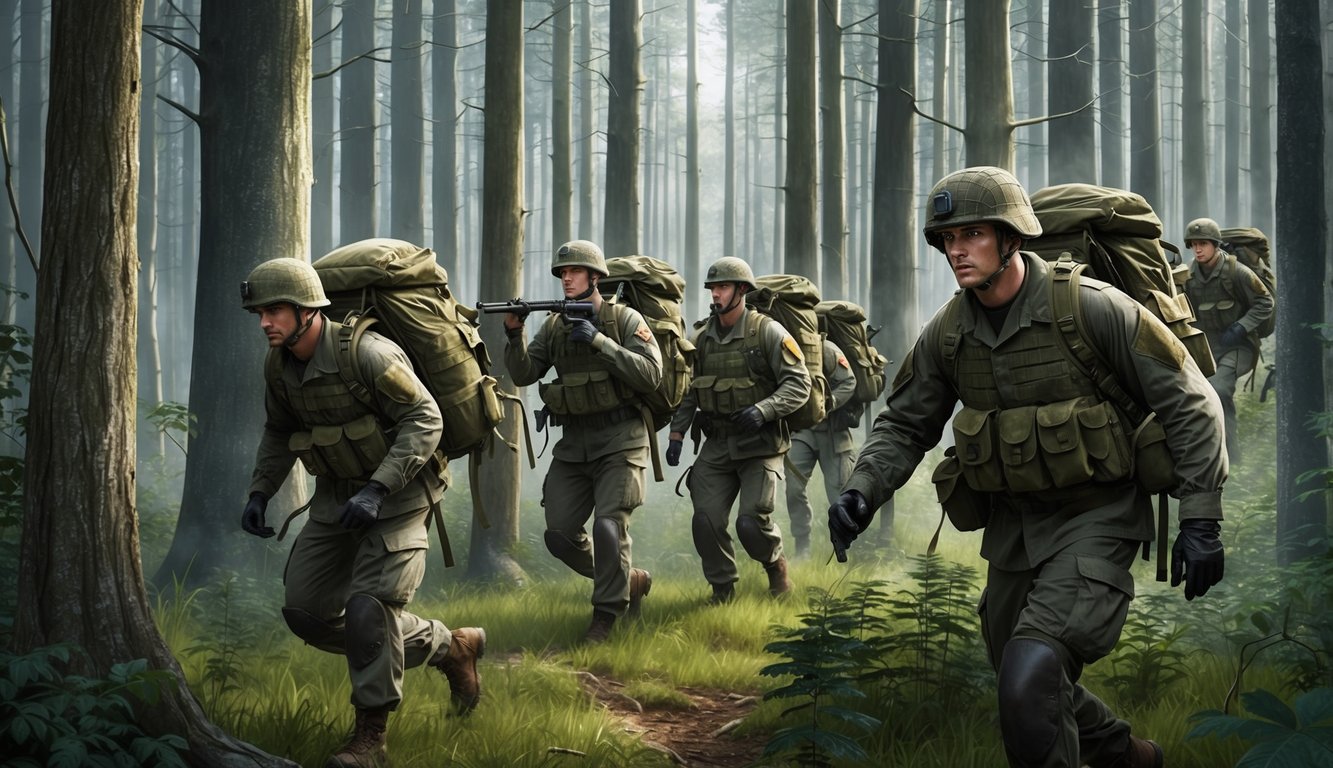
Boot camp teaches essential skills to help you survive and navigate in challenging conditions.
You will acquire techniques to manage emergencies and orient yourself in new terrains.
First Aid and Medical Training
During training, you will gain proficiency in basic first aid skills that could save lives in the field.
You’ll learn to handle common injuries like cuts, burns, and sprains, including how to apply appropriate bandages and stop bleeding.
Furthermore, you will master CPR and responding to severe medical emergencies.
Boot camp also covers essential sanitation and hygiene practices.
You’ll learn necessary techniques for purifying water and avoiding illness in challenging environments, which is vital for any extended mission.
Land Navigation and Orienteering
Your ability to read maps and utilize a compass will be honed during boot camp.
You’ll be taught to plot coordinates, measure distances, and recognize terrain characteristics.
Practice time outdoors will be ample as you navigate through a variety of landscapes, often at night or during inclement weather.
These exercises will build your confidence in navigating without technology.
Moreover, you’ll learn to use natural indicators such as the sun and stars for direction, providing crucial skills should modern tools fail.
By training completion, you’ll be equipped to plan routes and guide others in unfamiliar territory.
Discipline and Values
Military boot camp fosters core values and discipline, shaping recruits into soldiers.
Drill instructors play a pivotal role in this transformation, while the Army’s ethos lays the groundwork for a service member’s identity.
Role of Drill Instructors
Drill instructors form the backbone of boot camp, guiding civilians into disciplined soldiers.
Their commanding presence isn’t mere theatrics; rather, their approach is fundamentally geared towards preparing you for high-pressure situations.
These experienced veterans enforce strict regulations that teach you to adhere to standards of discipline.
You’ll learn to make your bed impeccably, maintain a mirror shine on your boots, and endure lengthy periods at attention, all of which build mental resilience and precision.
However, beneath their tough demeanor, drill instructors are deeply committed to your safety and success.
Their ultimate goal is to prepare you for the rigors of military life and potential combat scenarios.
Army Values and Ethos
Throughout your training, the Army instills a set of core values that will guide your behavior throughout your military career.
You’ll become well-acquainted with concepts like loyalty, duty, respect, selfless service, honor, integrity, and personal courage—tenets that become integral to your identity as a soldier.
You will internalize the Soldier’s Creed and Warrior Ethos, both of which emphasize prioritizing the mission and maintaining an attitude of perseverance.
These principles will teach you the importance of teamwork and the necessity of supporting your fellow soldiers.
Boot camp will constantly challenge your ethical understanding through daily activities that test your integrity and courage, imparting skills that will serve you well in both military and civilian settings.
Graduation and Beyond
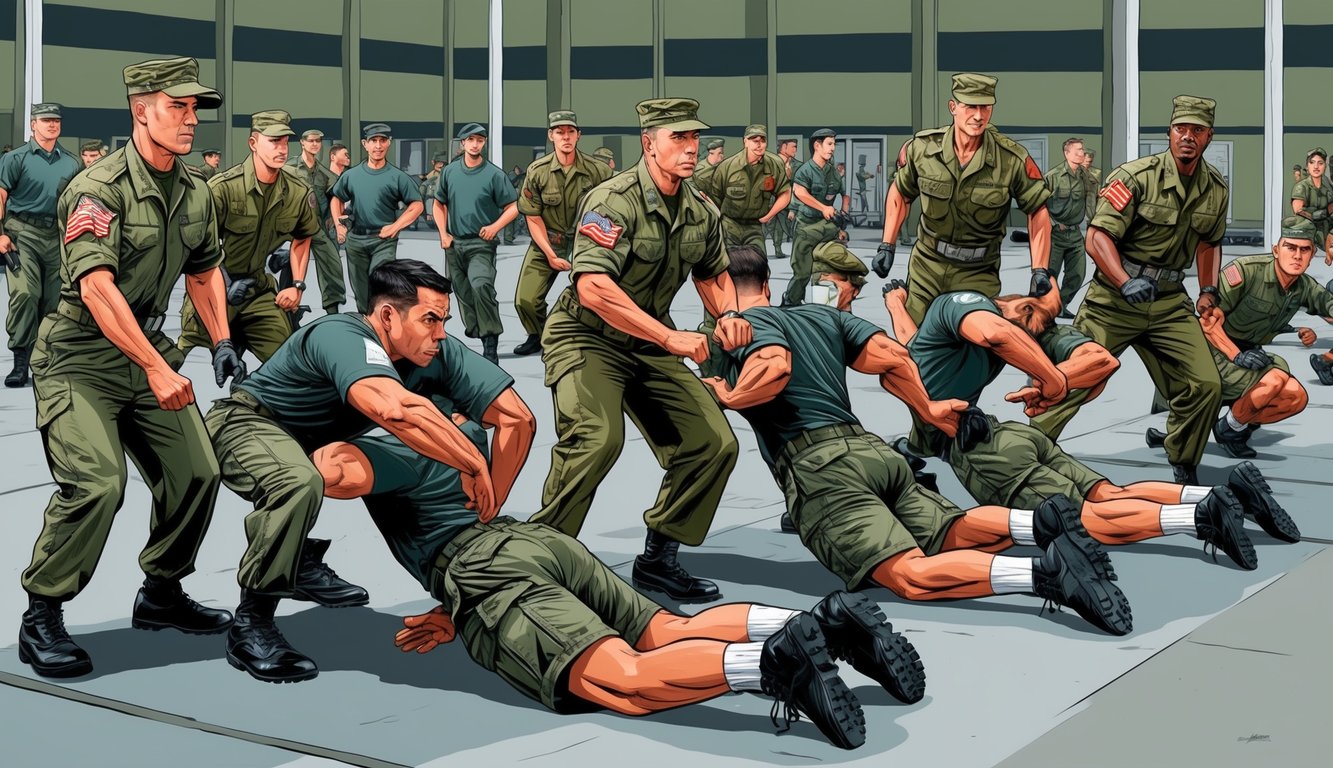
Graduating from boot camp represents a significant milestone in a military career.
The metamorphosis from civilian to service member is profound, laying the groundwork for future endeavors and challenges.
Military Transformation
You’ll don your dress uniform, basking in a sense of achievement.
Your family may witness your transformation, noting the discipline and confidence you've acquired.
The ceremony often includes a parade and formal acknowledgment of your accomplishments.
You are not the same person who arrived; you’ve gained strength, resilience, and a profound sense of camaraderie.
The shared experiences with your comrades have forged enduring bonds.
Your communication abilities will have notably improved.
You’ll know how to operate well within a team and exhibit leadership when necessary.
These competencies will continue to serve you well throughout your military career and beyond.
Preparing for a Military Career
After graduation, your journey continues with specialized training tailored to your specific military role.
This training may involve acquiring technical expertise, mastering advanced combat strategies, or developing leadership qualities.
It’s essential to maintain the fitness levels you achieved during boot camp; thus, consistent exercise and proper nutrition will become staples in your daily regimen.
Continuous education is vital in the military.
Throughout your career, you’ll have further opportunities for learning and training, ranging from college courses to specialized military schools.
Adapting to military life requires time, as you will learn to blend your responsibilities with personal life.
The discipline and time management learned during boot camp will facilitate your transition into this new chapter.
Frequently Asked Questions
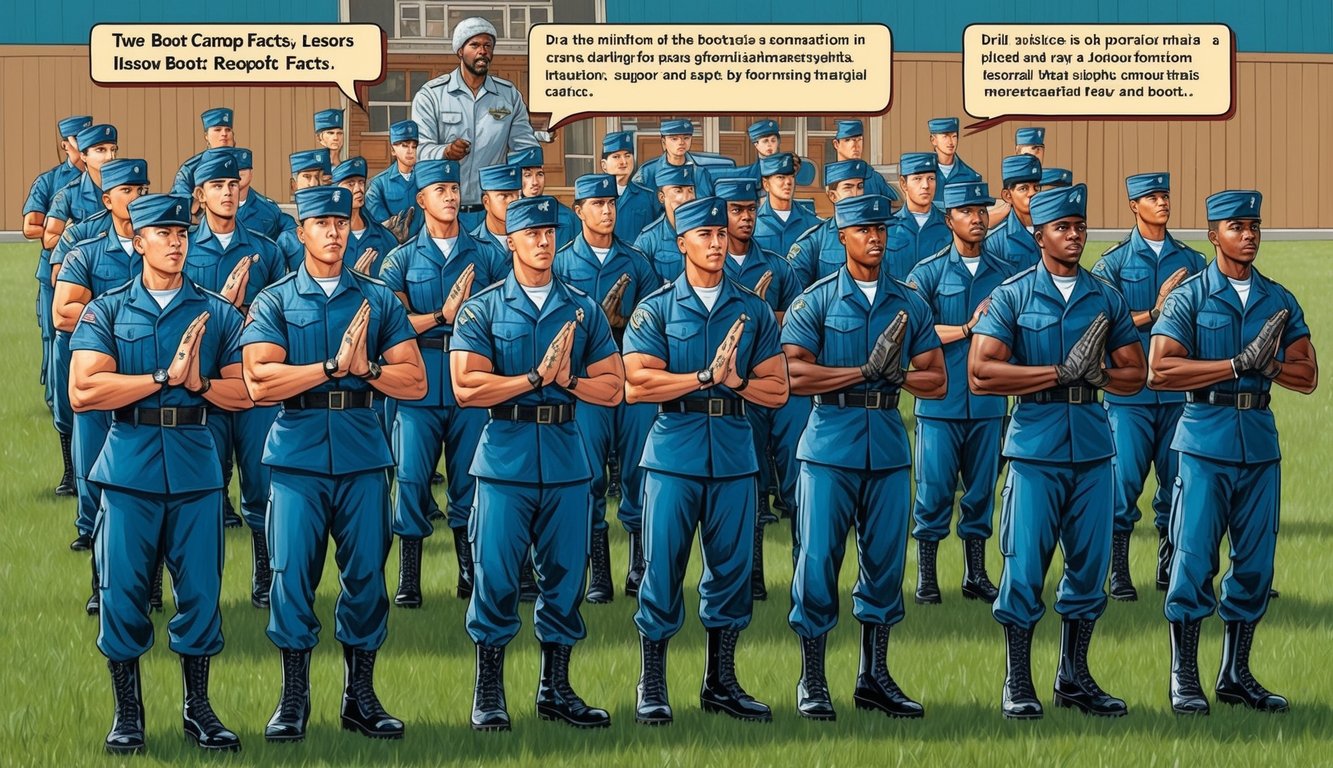
Boot camp is a comprehensive challenge for recruits, testing both physical and mental limits.
Preparation, fitness benchmarks, and dropout rates differ across military branches.
Here are some vital insights to consider before embarking on basic training.
What unexpected challenges might one encounter during military boot camp?
You may be taken aback by the mental hurdles.
Adherence to strict schedules, constant oversight, and limited personal time can prove daunting, while homesickness can be pervasive, even for resilient recruits.
Expect sleep deprivation to be a common experience, as you will likely begin your days very early and endure long, demanding hours.
How can you physically prepare for the rigors of Army basic training?
Establish a fitness regimen well before boot camp starts.
Concentrate on cardiovascular exercises such as running and swimming, while strengthening your body through push-ups, sit-ups, and pull-ups.
Engage in ruck marches with a weighted backpack, gradually increasing both distance and weight to ready yourself for long marches.
What are the minimum fitness standards for Navy boot camp?
Navy boot camp includes a Physical Fitness Assessment that you must pass.
For males aged 17-19, this involves completing at least 42 push-ups in 2 minutes, 50 sit-ups in 2 minutes, and running 1.5 miles in under 12:30.
For females in the same age group, the minimums are 19 push-ups, 50 sit-ups, and a run time of 15:00.
What should you know before beginning basic training for the Army?
Familiarize yourself with basic military customs and courtesies.
Memorize your general orders and Army values to understand what is expected of you.
Begin adjusting your waking hours to prepare for early mornings.
Practice attention to detail in daily tasks since this skill will be indispensable during inspections and training activities.
Which military branch is recognized for having the most demanding boot camp?
The Marine Corps is often regarded as having the most rigorous basic training, lasting 13 weeks and characterized by intense psychological and physical tests.
Marine Corps Recruit Training is notorious for its extreme challenges, including grueling obstacle courses and stringent discipline.
What percentage of recruits fail to complete Army boot camp, and what are the reasons?
Approximately 10-15% of Army recruits do not finish basic training, with common causes being physical injuries, mental health challenges, and failure to meet fitness standards.
Some recruits find it difficult to adjust to the strict regime and ultimately conclude that military life is not for them.
Others may be discharged due to behavioral or medical issues.

